Organisational Behaviour Report: Sainsbury's Performance Analysis
VerifiedAdded on 2023/01/05
|10
|1845
|47
Report
AI Summary
This report provides an analysis of organisational behaviour within Sainsbury, a major UK retailer. It examines the influence of organisational culture, power dynamics, and political behaviours on individual and team performance. The report delves into the impact of various power structures, including coercive, reward, legitimate, referent, expert, and informational power. It also explores the effects of organisational politics and culture, referencing Hardy's cultural typology. Furthermore, the report evaluates content and process theories of motivation, such as Maslow's hierarchy of needs and Vroom's expectancy theory, and assesses how these theories and motivational techniques enable effective goal achievement within an organisational context. The conclusion summarises the key findings, emphasizing the importance of understanding and managing these factors for improved organisational outcomes. The report includes references to academic journals and books.
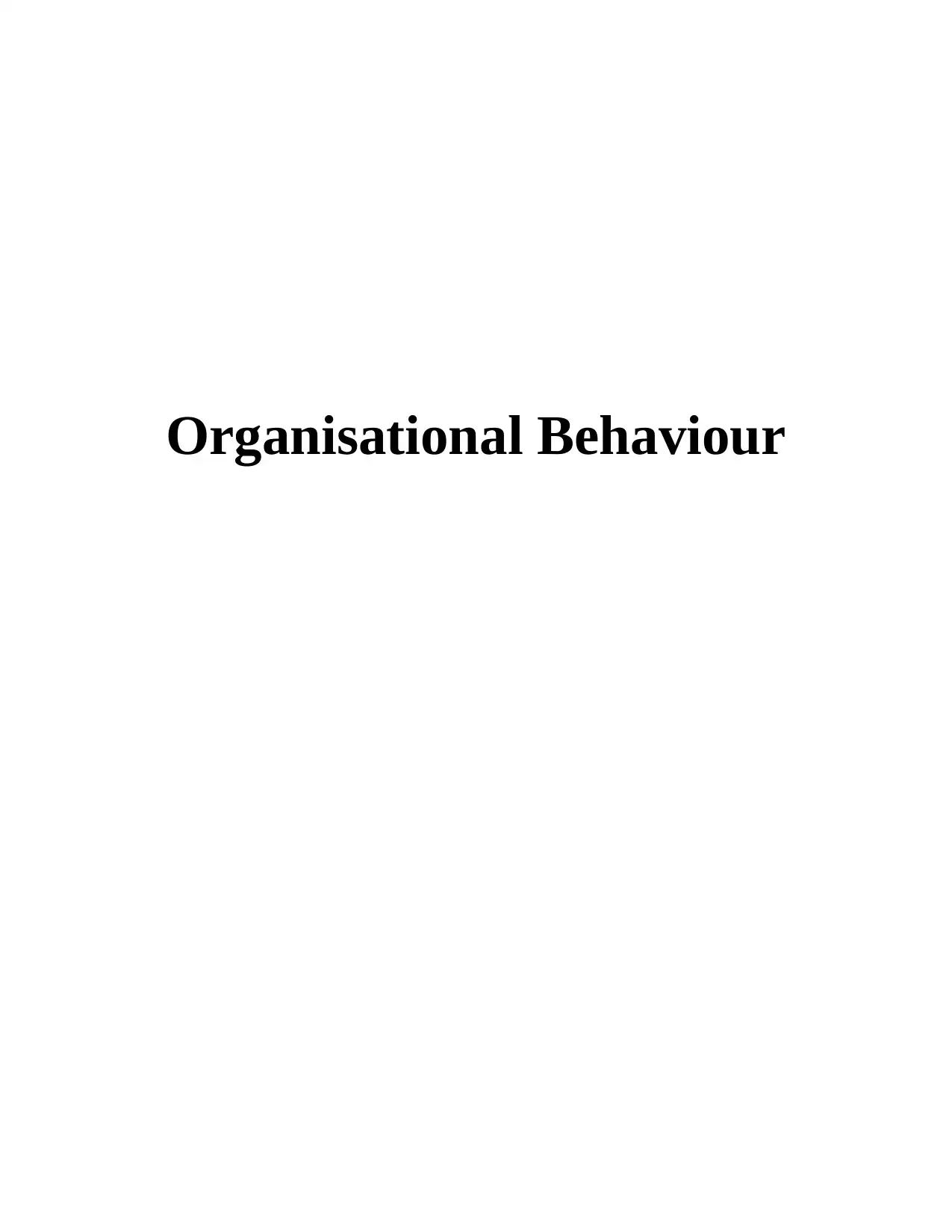
Organisational Behaviour
Paraphrase This Document
Need a fresh take? Get an instant paraphrase of this document with our AI Paraphraser

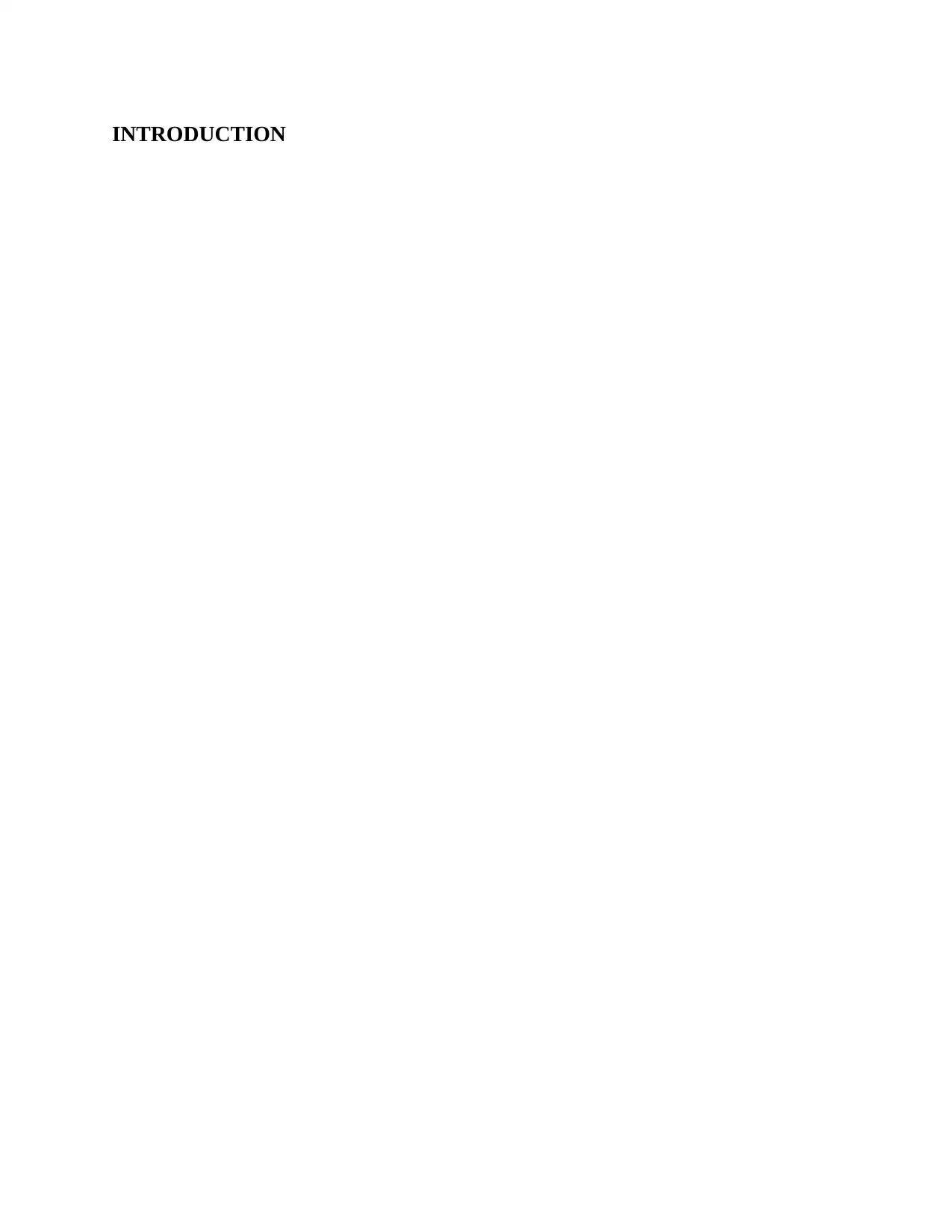
INTRODUCTION
⊘ This is a preview!⊘
Do you want full access?
Subscribe today to unlock all pages.

Trusted by 1+ million students worldwide
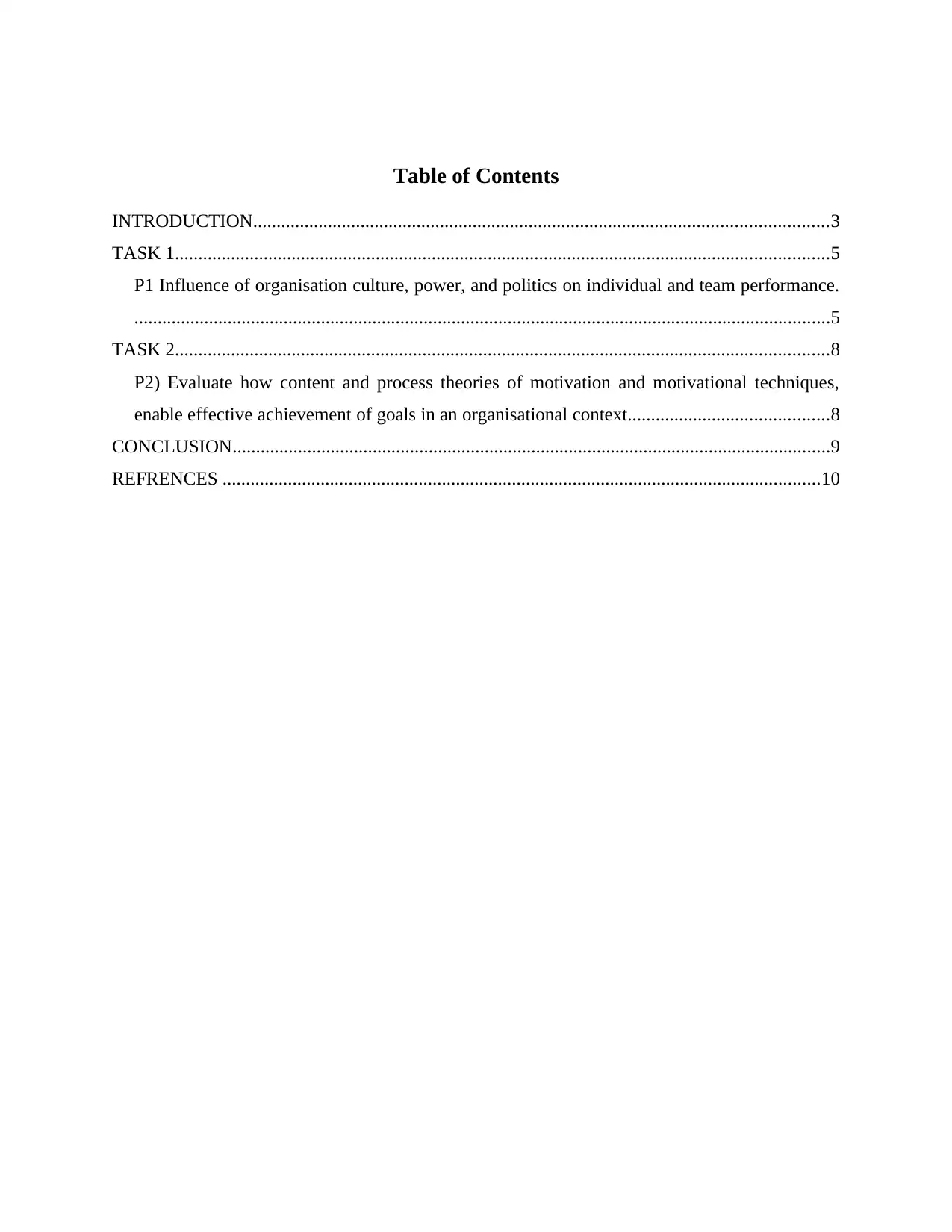
Table of Contents
INTRODUCTION...........................................................................................................................3
TASK 1............................................................................................................................................5
P1 Influence of organisation culture, power, and politics on individual and team performance.
.....................................................................................................................................................5
TASK 2............................................................................................................................................8
P2) Evaluate how content and process theories of motivation and motivational techniques,
enable effective achievement of goals in an organisational context...........................................8
CONCLUSION................................................................................................................................9
REFRENCES ................................................................................................................................10
INTRODUCTION...........................................................................................................................3
TASK 1............................................................................................................................................5
P1 Influence of organisation culture, power, and politics on individual and team performance.
.....................................................................................................................................................5
TASK 2............................................................................................................................................8
P2) Evaluate how content and process theories of motivation and motivational techniques,
enable effective achievement of goals in an organisational context...........................................8
CONCLUSION................................................................................................................................9
REFRENCES ................................................................................................................................10
Paraphrase This Document
Need a fresh take? Get an instant paraphrase of this document with our AI Paraphraser
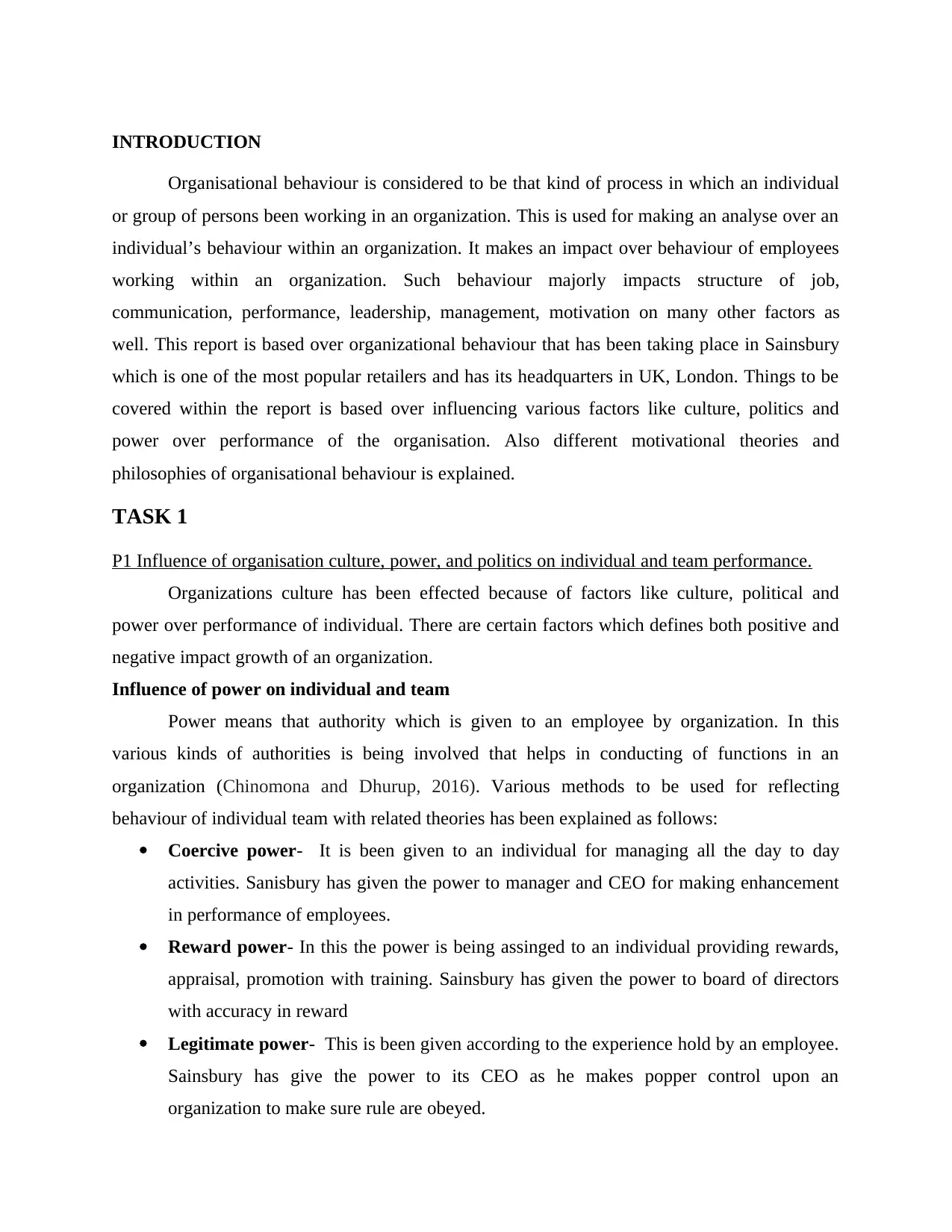
INTRODUCTION
Organisational behaviour is considered to be that kind of process in which an individual
or group of persons been working in an organization. This is used for making an analyse over an
individual’s behaviour within an organization. It makes an impact over behaviour of employees
working within an organization. Such behaviour majorly impacts structure of job,
communication, performance, leadership, management, motivation on many other factors as
well. This report is based over organizational behaviour that has been taking place in Sainsbury
which is one of the most popular retailers and has its headquarters in UK, London. Things to be
covered within the report is based over influencing various factors like culture, politics and
power over performance of the organisation. Also different motivational theories and
philosophies of organisational behaviour is explained.
TASK 1
P1 Influence of organisation culture, power, and politics on individual and team performance.
Organizations culture has been effected because of factors like culture, political and
power over performance of individual. There are certain factors which defines both positive and
negative impact growth of an organization.
Influence of power on individual and team
Power means that authority which is given to an employee by organization. In this
various kinds of authorities is being involved that helps in conducting of functions in an
organization (Chinomona and Dhurup, 2016). Various methods to be used for reflecting
behaviour of individual team with related theories has been explained as follows:
Coercive power- It is been given to an individual for managing all the day to day
activities. Sanisbury has given the power to manager and CEO for making enhancement
in performance of employees.
Reward power- In this the power is being assinged to an individual providing rewards,
appraisal, promotion with training. Sainsbury has given the power to board of directors
with accuracy in reward
Legitimate power- This is been given according to the experience hold by an employee.
Sainsbury has give the power to its CEO as he makes popper control upon an
organization to make sure rule are obeyed.
Organisational behaviour is considered to be that kind of process in which an individual
or group of persons been working in an organization. This is used for making an analyse over an
individual’s behaviour within an organization. It makes an impact over behaviour of employees
working within an organization. Such behaviour majorly impacts structure of job,
communication, performance, leadership, management, motivation on many other factors as
well. This report is based over organizational behaviour that has been taking place in Sainsbury
which is one of the most popular retailers and has its headquarters in UK, London. Things to be
covered within the report is based over influencing various factors like culture, politics and
power over performance of the organisation. Also different motivational theories and
philosophies of organisational behaviour is explained.
TASK 1
P1 Influence of organisation culture, power, and politics on individual and team performance.
Organizations culture has been effected because of factors like culture, political and
power over performance of individual. There are certain factors which defines both positive and
negative impact growth of an organization.
Influence of power on individual and team
Power means that authority which is given to an employee by organization. In this
various kinds of authorities is being involved that helps in conducting of functions in an
organization (Chinomona and Dhurup, 2016). Various methods to be used for reflecting
behaviour of individual team with related theories has been explained as follows:
Coercive power- It is been given to an individual for managing all the day to day
activities. Sanisbury has given the power to manager and CEO for making enhancement
in performance of employees.
Reward power- In this the power is being assinged to an individual providing rewards,
appraisal, promotion with training. Sainsbury has given the power to board of directors
with accuracy in reward
Legitimate power- This is been given according to the experience hold by an employee.
Sainsbury has give the power to its CEO as he makes popper control upon an
organization to make sure rule are obeyed.
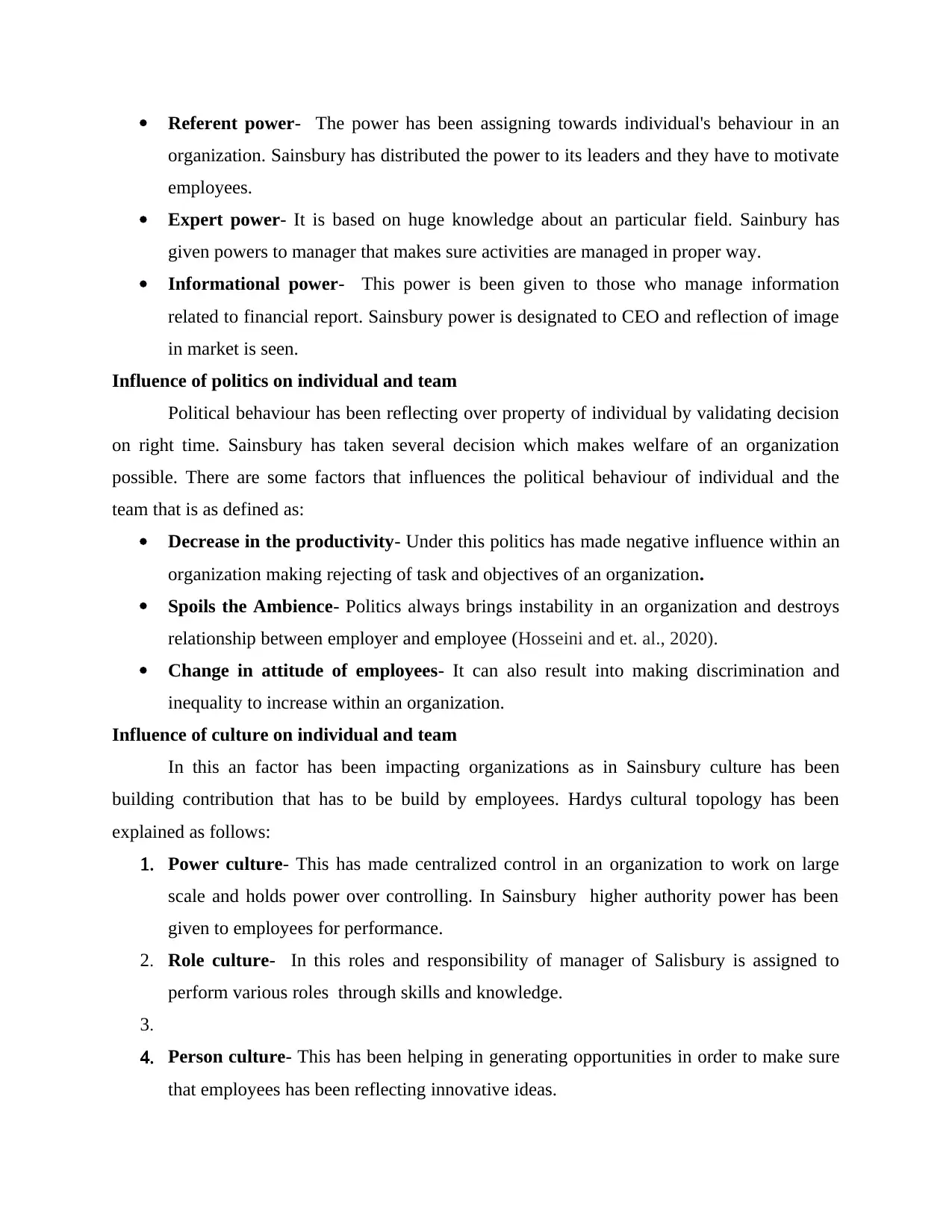
Referent power- The power has been assigning towards individual's behaviour in an
organization. Sainsbury has distributed the power to its leaders and they have to motivate
employees.
Expert power- It is based on huge knowledge about an particular field. Sainbury has
given powers to manager that makes sure activities are managed in proper way.
Informational power- This power is been given to those who manage information
related to financial report. Sainsbury power is designated to CEO and reflection of image
in market is seen.
Influence of politics on individual and team
Political behaviour has been reflecting over property of individual by validating decision
on right time. Sainsbury has taken several decision which makes welfare of an organization
possible. There are some factors that influences the political behaviour of individual and the
team that is as defined as:
Decrease in the productivity- Under this politics has made negative influence within an
organization making rejecting of task and objectives of an organization.
Spoils the Ambience- Politics always brings instability in an organization and destroys
relationship between employer and employee (Hosseini and et. al., 2020).
Change in attitude of employees- It can also result into making discrimination and
inequality to increase within an organization.
Influence of culture on individual and team
In this an factor has been impacting organizations as in Sainsbury culture has been
building contribution that has to be build by employees. Hardys cultural topology has been
explained as follows:
1. Power culture- This has made centralized control in an organization to work on large
scale and holds power over controlling. In Sainsbury higher authority power has been
given to employees for performance.
2. Role culture- In this roles and responsibility of manager of Salisbury is assigned to
perform various roles through skills and knowledge.
3.
4. Person culture- This has been helping in generating opportunities in order to make sure
that employees has been reflecting innovative ideas.
organization. Sainsbury has distributed the power to its leaders and they have to motivate
employees.
Expert power- It is based on huge knowledge about an particular field. Sainbury has
given powers to manager that makes sure activities are managed in proper way.
Informational power- This power is been given to those who manage information
related to financial report. Sainsbury power is designated to CEO and reflection of image
in market is seen.
Influence of politics on individual and team
Political behaviour has been reflecting over property of individual by validating decision
on right time. Sainsbury has taken several decision which makes welfare of an organization
possible. There are some factors that influences the political behaviour of individual and the
team that is as defined as:
Decrease in the productivity- Under this politics has made negative influence within an
organization making rejecting of task and objectives of an organization.
Spoils the Ambience- Politics always brings instability in an organization and destroys
relationship between employer and employee (Hosseini and et. al., 2020).
Change in attitude of employees- It can also result into making discrimination and
inequality to increase within an organization.
Influence of culture on individual and team
In this an factor has been impacting organizations as in Sainsbury culture has been
building contribution that has to be build by employees. Hardys cultural topology has been
explained as follows:
1. Power culture- This has made centralized control in an organization to work on large
scale and holds power over controlling. In Sainsbury higher authority power has been
given to employees for performance.
2. Role culture- In this roles and responsibility of manager of Salisbury is assigned to
perform various roles through skills and knowledge.
3.
4. Person culture- This has been helping in generating opportunities in order to make sure
that employees has been reflecting innovative ideas.
⊘ This is a preview!⊘
Do you want full access?
Subscribe today to unlock all pages.

Trusted by 1+ million students worldwide
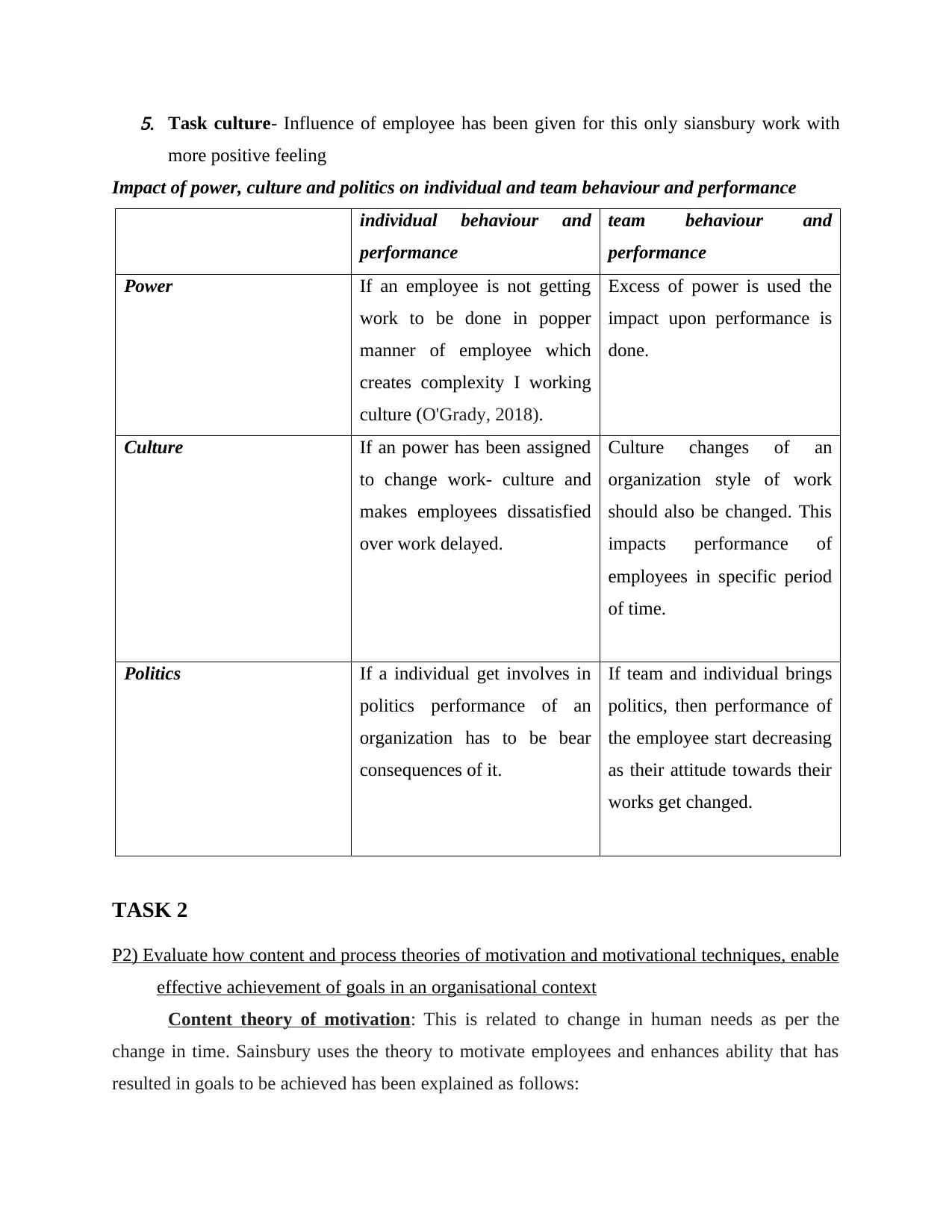
5. Task culture- Influence of employee has been given for this only siansbury work with
more positive feeling
Impact of power, culture and politics on individual and team behaviour and performance
individual behaviour and
performance
team behaviour and
performance
Power If an employee is not getting
work to be done in popper
manner of employee which
creates complexity I working
culture (O'Grady, 2018).
Excess of power is used the
impact upon performance is
done.
Culture If an power has been assigned
to change work- culture and
makes employees dissatisfied
over work delayed.
Culture changes of an
organization style of work
should also be changed. This
impacts performance of
employees in specific period
of time.
Politics If a individual get involves in
politics performance of an
organization has to be bear
consequences of it.
If team and individual brings
politics, then performance of
the employee start decreasing
as their attitude towards their
works get changed.
TASK 2
P2) Evaluate how content and process theories of motivation and motivational techniques, enable
effective achievement of goals in an organisational context
Content theory of motivation: This is related to change in human needs as per the
change in time. Sainsbury uses the theory to motivate employees and enhances ability that has
resulted in goals to be achieved has been explained as follows:
more positive feeling
Impact of power, culture and politics on individual and team behaviour and performance
individual behaviour and
performance
team behaviour and
performance
Power If an employee is not getting
work to be done in popper
manner of employee which
creates complexity I working
culture (O'Grady, 2018).
Excess of power is used the
impact upon performance is
done.
Culture If an power has been assigned
to change work- culture and
makes employees dissatisfied
over work delayed.
Culture changes of an
organization style of work
should also be changed. This
impacts performance of
employees in specific period
of time.
Politics If a individual get involves in
politics performance of an
organization has to be bear
consequences of it.
If team and individual brings
politics, then performance of
the employee start decreasing
as their attitude towards their
works get changed.
TASK 2
P2) Evaluate how content and process theories of motivation and motivational techniques, enable
effective achievement of goals in an organisational context
Content theory of motivation: This is related to change in human needs as per the
change in time. Sainsbury uses the theory to motivate employees and enhances ability that has
resulted in goals to be achieved has been explained as follows:
Paraphrase This Document
Need a fresh take? Get an instant paraphrase of this document with our AI Paraphraser
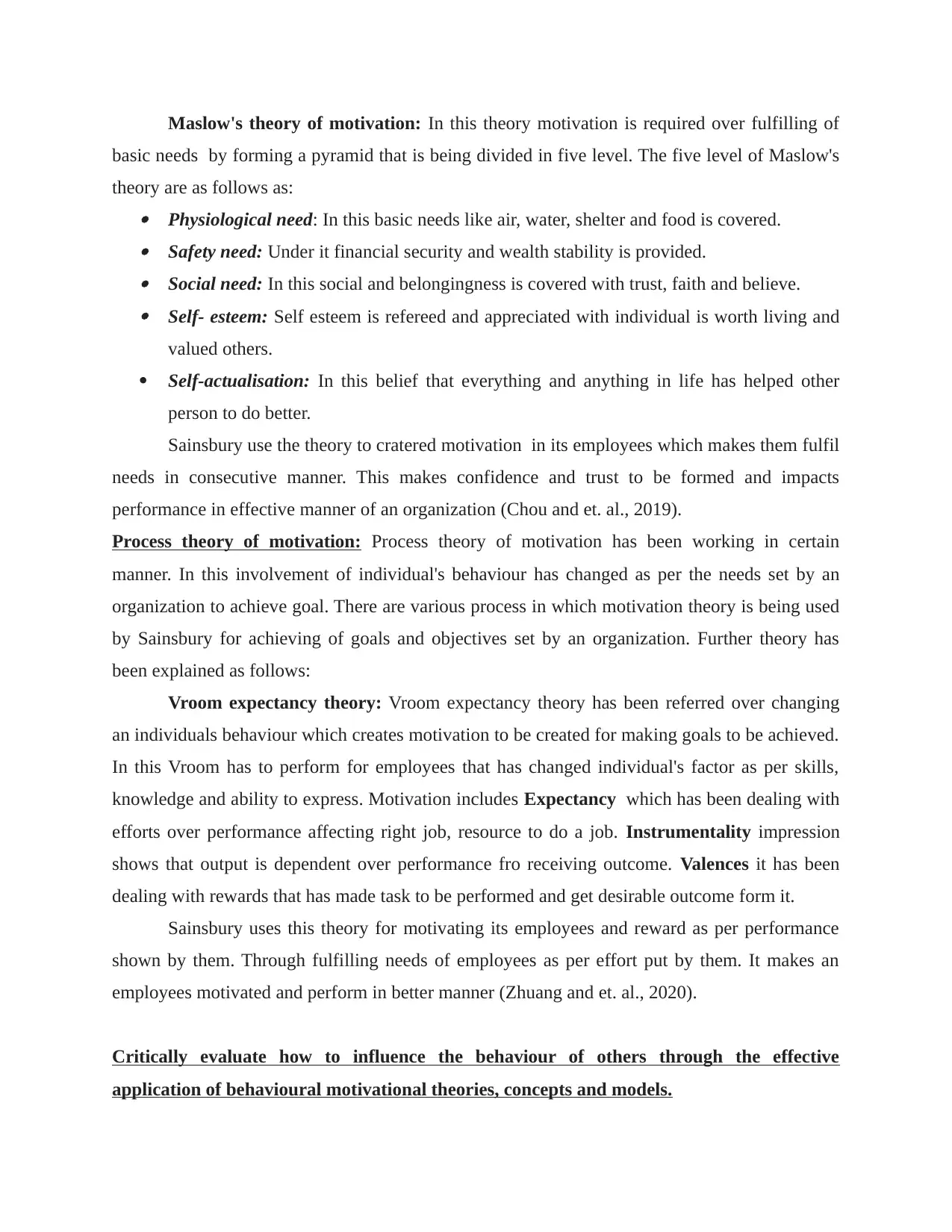
Maslow's theory of motivation: In this theory motivation is required over fulfilling of
basic needs by forming a pyramid that is being divided in five level. The five level of Maslow's
theory are as follows as: Physiological need: In this basic needs like air, water, shelter and food is covered. Safety need: Under it financial security and wealth stability is provided. Social need: In this social and belongingness is covered with trust, faith and believe. Self- esteem: Self esteem is refereed and appreciated with individual is worth living and
valued others.
Self-actualisation: In this belief that everything and anything in life has helped other
person to do better.
Sainsbury use the theory to cratered motivation in its employees which makes them fulfil
needs in consecutive manner. This makes confidence and trust to be formed and impacts
performance in effective manner of an organization (Chou and et. al., 2019).
Process theory of motivation: Process theory of motivation has been working in certain
manner. In this involvement of individual's behaviour has changed as per the needs set by an
organization to achieve goal. There are various process in which motivation theory is being used
by Sainsbury for achieving of goals and objectives set by an organization. Further theory has
been explained as follows:
Vroom expectancy theory: Vroom expectancy theory has been referred over changing
an individuals behaviour which creates motivation to be created for making goals to be achieved.
In this Vroom has to perform for employees that has changed individual's factor as per skills,
knowledge and ability to express. Motivation includes Expectancy which has been dealing with
efforts over performance affecting right job, resource to do a job. Instrumentality impression
shows that output is dependent over performance fro receiving outcome. Valences it has been
dealing with rewards that has made task to be performed and get desirable outcome form it.
Sainsbury uses this theory for motivating its employees and reward as per performance
shown by them. Through fulfilling needs of employees as per effort put by them. It makes an
employees motivated and perform in better manner (Zhuang and et. al., 2020).
Critically evaluate how to influence the behaviour of others through the effective
application of behavioural motivational theories, concepts and models.
basic needs by forming a pyramid that is being divided in five level. The five level of Maslow's
theory are as follows as: Physiological need: In this basic needs like air, water, shelter and food is covered. Safety need: Under it financial security and wealth stability is provided. Social need: In this social and belongingness is covered with trust, faith and believe. Self- esteem: Self esteem is refereed and appreciated with individual is worth living and
valued others.
Self-actualisation: In this belief that everything and anything in life has helped other
person to do better.
Sainsbury use the theory to cratered motivation in its employees which makes them fulfil
needs in consecutive manner. This makes confidence and trust to be formed and impacts
performance in effective manner of an organization (Chou and et. al., 2019).
Process theory of motivation: Process theory of motivation has been working in certain
manner. In this involvement of individual's behaviour has changed as per the needs set by an
organization to achieve goal. There are various process in which motivation theory is being used
by Sainsbury for achieving of goals and objectives set by an organization. Further theory has
been explained as follows:
Vroom expectancy theory: Vroom expectancy theory has been referred over changing
an individuals behaviour which creates motivation to be created for making goals to be achieved.
In this Vroom has to perform for employees that has changed individual's factor as per skills,
knowledge and ability to express. Motivation includes Expectancy which has been dealing with
efforts over performance affecting right job, resource to do a job. Instrumentality impression
shows that output is dependent over performance fro receiving outcome. Valences it has been
dealing with rewards that has made task to be performed and get desirable outcome form it.
Sainsbury uses this theory for motivating its employees and reward as per performance
shown by them. Through fulfilling needs of employees as per effort put by them. It makes an
employees motivated and perform in better manner (Zhuang and et. al., 2020).
Critically evaluate how to influence the behaviour of others through the effective
application of behavioural motivational theories, concepts and models.
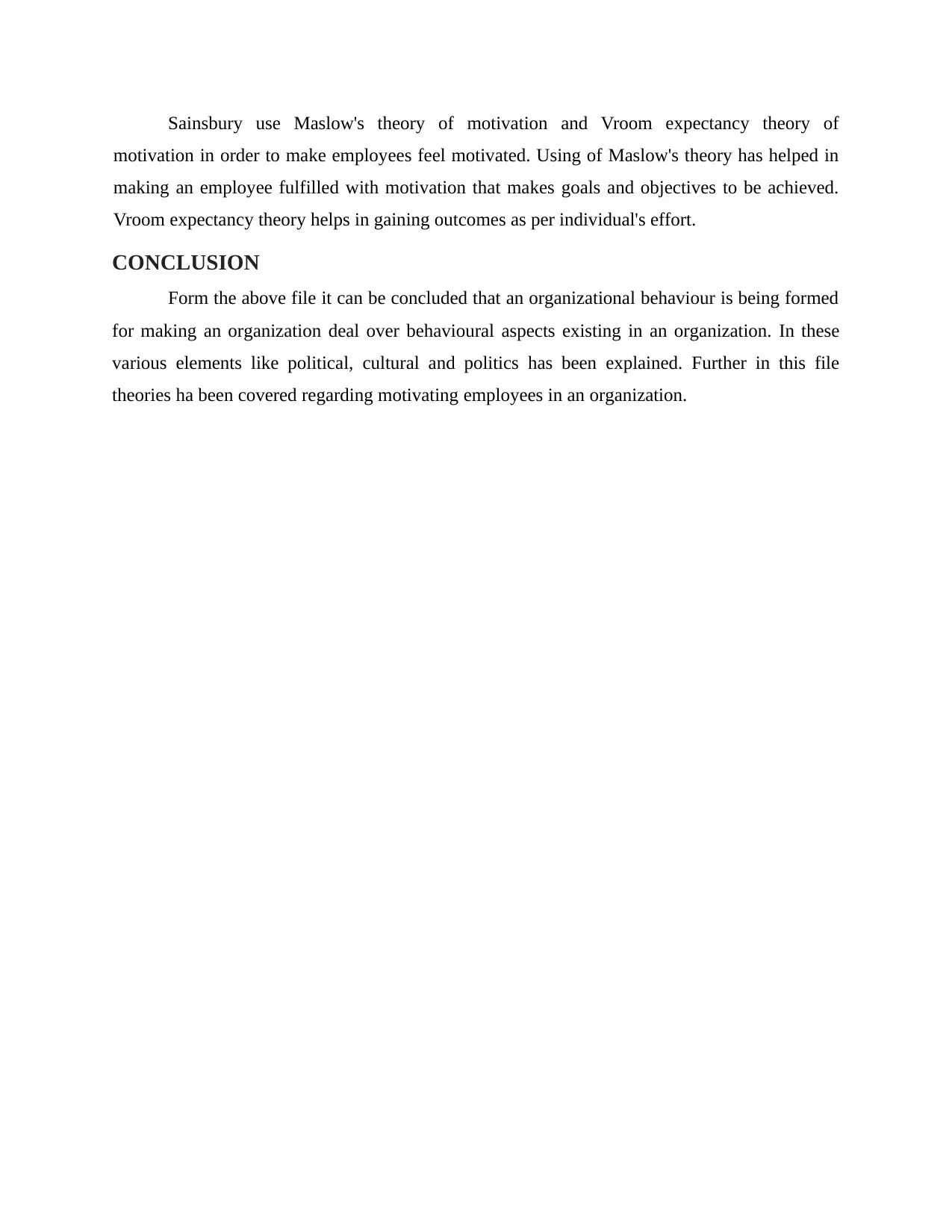
Sainsbury use Maslow's theory of motivation and Vroom expectancy theory of
motivation in order to make employees feel motivated. Using of Maslow's theory has helped in
making an employee fulfilled with motivation that makes goals and objectives to be achieved.
Vroom expectancy theory helps in gaining outcomes as per individual's effort.
CONCLUSION
Form the above file it can be concluded that an organizational behaviour is being formed
for making an organization deal over behavioural aspects existing in an organization. In these
various elements like political, cultural and politics has been explained. Further in this file
theories ha been covered regarding motivating employees in an organization.
motivation in order to make employees feel motivated. Using of Maslow's theory has helped in
making an employee fulfilled with motivation that makes goals and objectives to be achieved.
Vroom expectancy theory helps in gaining outcomes as per individual's effort.
CONCLUSION
Form the above file it can be concluded that an organizational behaviour is being formed
for making an organization deal over behavioural aspects existing in an organization. In these
various elements like political, cultural and politics has been explained. Further in this file
theories ha been covered regarding motivating employees in an organization.
⊘ This is a preview!⊘
Do you want full access?
Subscribe today to unlock all pages.

Trusted by 1+ million students worldwide
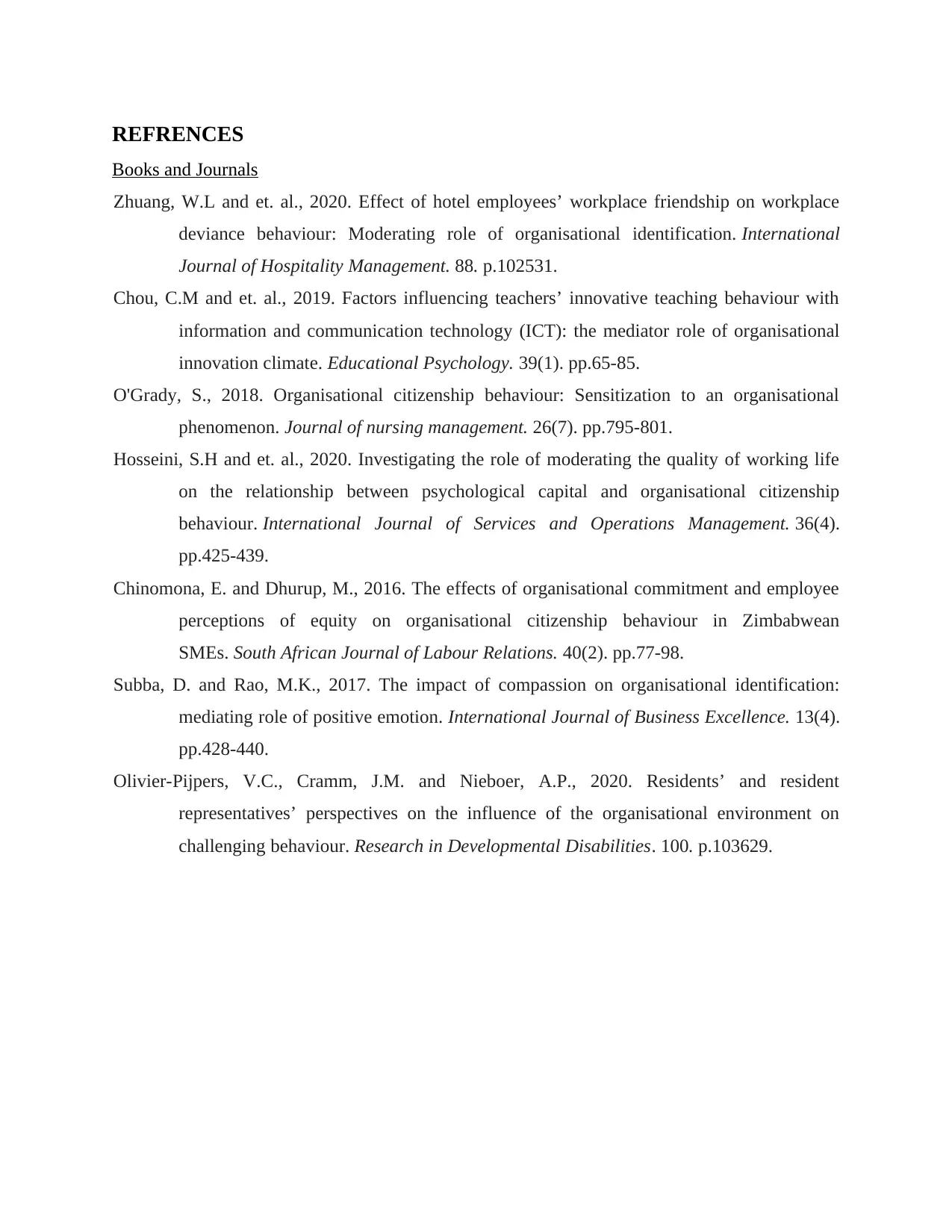
REFRENCES
Books and Journals
Zhuang, W.L and et. al., 2020. Effect of hotel employees’ workplace friendship on workplace
deviance behaviour: Moderating role of organisational identification. International
Journal of Hospitality Management. 88. p.102531.
Chou, C.M and et. al., 2019. Factors influencing teachers’ innovative teaching behaviour with
information and communication technology (ICT): the mediator role of organisational
innovation climate. Educational Psychology. 39(1). pp.65-85.
O'Grady, S., 2018. Organisational citizenship behaviour: Sensitization to an organisational
phenomenon. Journal of nursing management. 26(7). pp.795-801.
Hosseini, S.H and et. al., 2020. Investigating the role of moderating the quality of working life
on the relationship between psychological capital and organisational citizenship
behaviour. International Journal of Services and Operations Management. 36(4).
pp.425-439.
Chinomona, E. and Dhurup, M., 2016. The effects of organisational commitment and employee
perceptions of equity on organisational citizenship behaviour in Zimbabwean
SMEs. South African Journal of Labour Relations. 40(2). pp.77-98.
Subba, D. and Rao, M.K., 2017. The impact of compassion on organisational identification:
mediating role of positive emotion. International Journal of Business Excellence. 13(4).
pp.428-440.
Olivier-Pijpers, V.C., Cramm, J.M. and Nieboer, A.P., 2020. Residents’ and resident
representatives’ perspectives on the influence of the organisational environment on
challenging behaviour. Research in Developmental Disabilities. 100. p.103629.
Books and Journals
Zhuang, W.L and et. al., 2020. Effect of hotel employees’ workplace friendship on workplace
deviance behaviour: Moderating role of organisational identification. International
Journal of Hospitality Management. 88. p.102531.
Chou, C.M and et. al., 2019. Factors influencing teachers’ innovative teaching behaviour with
information and communication technology (ICT): the mediator role of organisational
innovation climate. Educational Psychology. 39(1). pp.65-85.
O'Grady, S., 2018. Organisational citizenship behaviour: Sensitization to an organisational
phenomenon. Journal of nursing management. 26(7). pp.795-801.
Hosseini, S.H and et. al., 2020. Investigating the role of moderating the quality of working life
on the relationship between psychological capital and organisational citizenship
behaviour. International Journal of Services and Operations Management. 36(4).
pp.425-439.
Chinomona, E. and Dhurup, M., 2016. The effects of organisational commitment and employee
perceptions of equity on organisational citizenship behaviour in Zimbabwean
SMEs. South African Journal of Labour Relations. 40(2). pp.77-98.
Subba, D. and Rao, M.K., 2017. The impact of compassion on organisational identification:
mediating role of positive emotion. International Journal of Business Excellence. 13(4).
pp.428-440.
Olivier-Pijpers, V.C., Cramm, J.M. and Nieboer, A.P., 2020. Residents’ and resident
representatives’ perspectives on the influence of the organisational environment on
challenging behaviour. Research in Developmental Disabilities. 100. p.103629.
1 out of 10
Related Documents
Your All-in-One AI-Powered Toolkit for Academic Success.
+13062052269
info@desklib.com
Available 24*7 on WhatsApp / Email
![[object Object]](/_next/static/media/star-bottom.7253800d.svg)
Unlock your academic potential
Copyright © 2020–2026 A2Z Services. All Rights Reserved. Developed and managed by ZUCOL.





